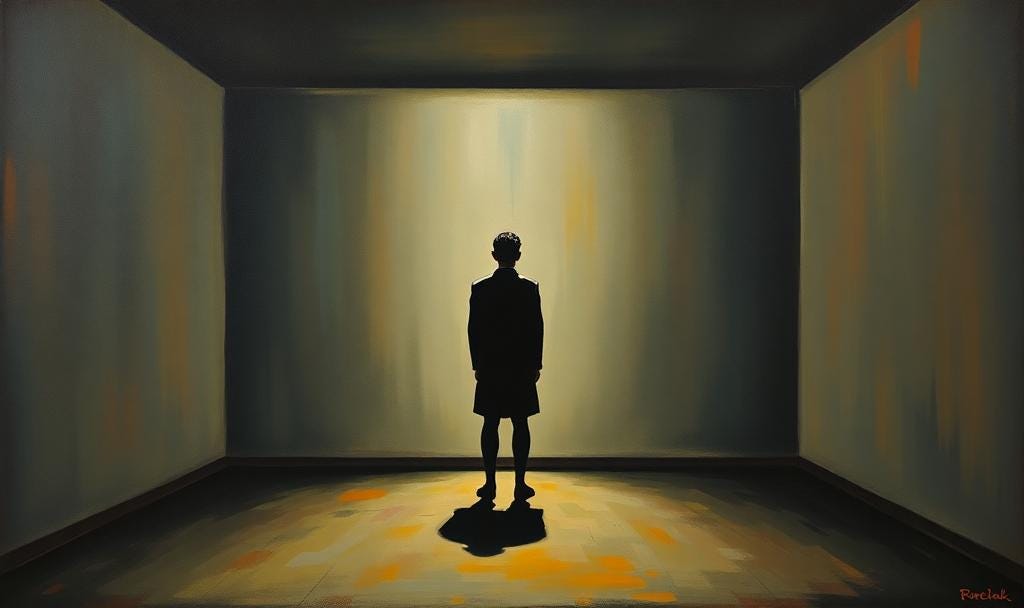It was around the third month into my physical detransition; I had already begun to socially detransition. By then, walking had become part of my routine—not just for exercise, but as a way to reconnect with myself. I’d been pushing hard, walking and jogging 4-6 miles daily, while adding in resistance training and learning how to build my muscles for the first time in my life—all as part of reclaiming my masculinity. The very masculinity that had been taken from me not only in my boyhood but also by a system without gatekeeping for safety’s sake.
The masculinity I sought belonged to me all along, long before I tried to change myself into something I was never meant to be. Before I tried to “fix” the gay. Here I was, coming back to myself, rediscovering my strength and who I truly am, only this time on my own terms. It was my authenticity I was after.
Years of estrogen had taken a toll on my body. I was left obese, nearly 300 pounds, lethargic, weighed down by a decision that was supposed to cure me—or so the cocktail of trauma, ideology, and hormones made me think. But with each workout, each walk, I was shedding that burden and building something stronger, something real.
By this point, I’d grown comfortable with my morning routine, familiar with the aches and pains that came with it. I welcomed the soreness; it reminded me that my body was responding. These walks truly became my time to reflect on my goals, my detransition, and the new life ahead. I took these walks in a well-kept nearby neighborhood, and on this particularly crisp fall morning, the trees were ablaze with fiery leaves in shades of orange and yellow. It was beautiful out; I was trying out my earbuds and listening to some classic rock, reveling in the fact that I had the sidewalks to myself! And as I climbed this steep bitch of a hill, I started to sweat, and my calves began to burn, but I embraced it. Then, as if by chance, through my headphones came Jimi Hendrix’s cover of All Along the Watchtower.

It’s fascinating to me how the power of music has the ability to capture memories and take us back to moments we thought we’d left behind; its nostalgic influence can allow our minds access to a collective knowledge. Hearing Hendrix’s iconic guitar riffs, I felt transported. In my mind’s eye, I was looking through my father’s eyes—helicopters, jungles, men deployed against their will, separated from their families, sent to commit unspeakable acts in the name of what? democracy?
I felt a deep sense of empathy for my father, and as I reached the top of that hill, I didn’t cry, but tears streamed down my face. In that moment, I understood. Even before I was born, I was affected by forces beyond my control. Those tears were not for myself—that war had broken my father in so many ways. And the wars before that had broken his father, and so on, through generations of trauma. In reality, I thought, they merely were pawns in an issue that has plagued society and men for a long time.
As I walked on, I reflected on how my father had become emotionally detached by his own trauma and rage, as he chose to face his own demons privately. Truth is, he was really ill-equipped for a young boy who didn’t meet the ideals of what society deemed a boy should be like in the 1980s. In fact I feel a-lot fathers of that time weren't.
This was especially true in a time when I was developing and figuring out that there was something different about me—something that the other kids didn’t like, something people in general didn’t like. Something that would eventually lead me to see myself as flawed, shameful, and inferior. This was a time in my life when I needed a hero; I needed the first man I ever fell in love with. I needed my dad. I’m sure this sounds familiar to many homosexual men. For me, he was emotionally unavailable.
Because I never seemed to meet my father’s approval, because my masculinity never measured up, his anger and rage became directed toward me increasingly through my childhood. Often unable to control himself physically abuse was not unknown in our household. Over time, I increasingly distanced myself from my father—and from all men, for that matter. My view of masculinity became unhealthy, distorted by his seeming rejection. I started to see men as unpredictable and violent, which only deepened my sense of isolation from men. Looking back, it’s no wonder I lacked social skills with men. Though I was attracted to them, I was also fearful of them. That in itself. It makes sense now how I turned to alcohol later in life as a social lubricant— this coping mechanism eventually led to my first addiction that lasted more than 20 years.
These experiences, and so much more, shaped my deep sense of shame—a shame that convinced me I was so flawed, I needed to “fix” my homosexuality by any means necessary. The truth I eventually woke to is no hormone or surgery could ever change the fact that I am, and always will be, a biological male or any of these issue that were forced upon me at such a young age.
Now, each walk I take isn’t about running away—it’s about coming back to myself. Each step, each hill climbed, is reclaiming a masculinity that I get to define for myself. This isn’t a struggle to “fix” or hide who I am anymore. It’s a journey back to the man I always was, to a masculinity that feels whole and honest. For me, detransitioning isn’t just about reversing a physical change; it’s about shedding layers of shame and releasing the weight of others' expectations. Even expectations of a toxic father.
For me this journey isn’t about accepting a new identity, but rather learning to embrace my authentic identity. I believe this realization came with that spontaneous moment of deep empathy at the top of that steep hill. A realization that true empathy can be transformative and deeply profound experience.
From that walk, I now have a much clearer understanding about how society’s entrenched homophobia has deeply impacted how I, and many others, relate to ourselves and the men in our lives. Homophobia often manifests within families, especially between fathers and sons. For many men, cultural messages about masculinity—rooted in rigid, sometimes toxic beliefs—dictate their sense of worth, identity, and success. Homosexuality is seen as incompatible with this image of “real masculinity,” causing some fathers to emotionally distance themselves from their sons out of fear, discomfort, or shame. These reactions can stem from a place of not knowing how to relate to a son whose identity challenges their deeply ingrained values and beliefs.
When a father internalizes societal views about gender and sexuality, he may feel pressured to “toughen up” his son, thinking he’s protecting him from a world that seems hostile to homosexuality. Instead of offering support, this can lead to judgment and hostility, as the father asserts control over the situation, perhaps without realizing the damage he’s causing. In fact this hostility and emotional detachment can create a double wound for the son. He’s left not only feeling unaccepted for who he is, but also robbed of a bond that could have offered comfort, validation, and guidance.
Additionally generational trauma plays a role here, too. Fathers from earlier generations often faced even stronger homophobic norms, where any sign of “femininity” or difference was met with mockery, or even violence. If these fathers haven’t worked through their own homophobia, they may struggle to accept their son’s identity, especially if it disrupts their rigid view of masculinity.
As I continue working through my own trauma, I’ve come to recognize the weight my father carried—the burdens he bore that left him little room for his own healing. I do respect him and those who came before, who did the best they could with what they knew, even if it left wounds I’ve had to mend. I have walked further down my path working on cultivating my authenticity themes of letting go and creating healthy boundaries with my father is what has ultimately served me best.
My story, though personal, echoes that of many others and serves as a call to society that something must change. The way we treat young boys, often with shame and silence, expecting them to ‘toughen up’ while denying them validation and forcing them into narrow definitions of masculinity, is psychologically harmful. It’s time to offer them acceptance and the freedom to grow into their own identities without the weight of outdated expectations.
In closing, I’ll keep taking my morning walks, my time, walking along this path towards authenticity—each step shedding, letting go of shame, reclaiming my strength, empathy for the past, holding space for the future . This is my path now, one I walk fully as man.








You’re an incredible writer and you could offer a beacon of hope and true understanding for others who feel similarly.
As the daughter of a damaged Vietnam Veteran I related so much to the struggles of your father and your relationship. Mine too often buried himself into alcohol and careers as a way to cope. He was 'there' but always seemed so afraid of becoming too 'involved' in our lives.
Luckily in my 20's we were finally able to connect and I realized he was a 18 year old boy fighting in a war he was drafted into. The horrors of that war followed him his whole life and ours too. I've lived with a war I never seen with my own eyes...
I lost him in 2012. My sister unfortunately wasn't able to fully reconnect with him. He was trying but sadly passed unexpectedly...if your father is still alive I hope you guys at least get a chance to make peace.
I love your vulnerability to share your journey. Thank you. ❤️